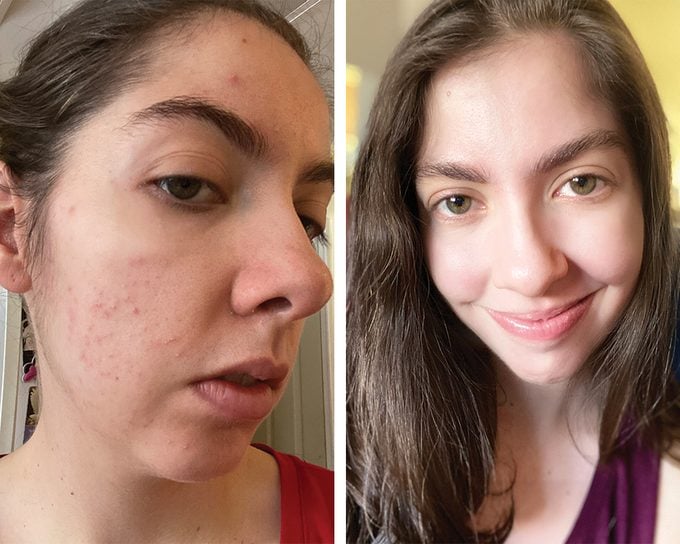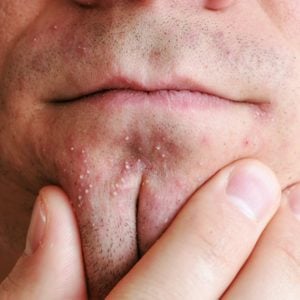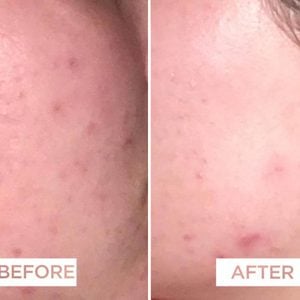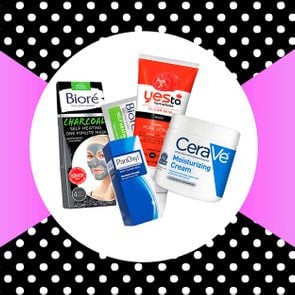How to Survive Taking Accutane for Acne—from Someone Who’s Done It Twice
Updated: Mar. 30, 2022
Yes, I've been through two rounds of isotretinoin for acne, despite the drug's side effects. Here's why I'm so happy I did it (including my Accutane before and after pictures).
Our editors and experts handpick every product we feature. We may earn a commission from your purchases.

What it’s like to take Accutane
Long gone were the days of puberty, greasy middle school cafeteria foods, and poor skincare habits, all possible and probable causes of acne. So why was my skin still breaking out, years later? I had reached a new level of frustration dealing with my adult acne.
It got particularly bad after I changed a few products in my skincare routine, antagonizing my mild acne breakouts. It was the last straw.
So I finally invested in my skin and went to see board-certified dermatologist Morgan Rabach, MD, of LMMedical in New York, to find a solution. (Here are the skincare ingredients to avoid if you have acne.)
I called in the big-gun professionals, and eventually, I went back on Accutane (isotretinoin). I had tried it high school, and here I was, almost 10 years later, trying it again.
Here’s what I learned—and everything you need to know about the side effects—if you want to try Accutane for acne. (Plus, my Accutane before and after photos.)
Why I decided to take Accutane (again)
First, it’s important to note that Accutane, an oral medication that’s a derivative of vitamin A, is not typically the first line of treatment against acne. In my case, Dr. Rabach and I made some changes to my topical skincare routine (products that you apply directly to the skin), first.
I used a prescription clindamycin regimen (a topical antibiotic treatment for mild acne) and over-the-counter adapalene (a topical retinoid for mild acne), also known as Differin gel. I also went on oral birth control pills. (Here are the skincare ingredients people with acne need to try.)
Although my acne did improve, I knew it could be better, because I once had clear skin. That’s when Dr. Rabach recommended Accutane. It’s actually the generic drug isotretinoin, but still commonly referred to by the former brand name, Accutane. And boy, did I have mixed feelings.
When I tried the drug back in high school, my skin was the best it’s ever been during those four years. That said, I also knew it was a major commitment to complete a course of isotretinoin.
Before you can get to your own Accutane before and after photos, you have to trust and follow the process. I understand that it’s a privilege to have access to the medication, yes, but it’s not an easy or quick-fix acne solution.
The prescription causes some uncomfortable side effects and requires a monthly blood test (if you can get pregnant) and appointment with your prescriber before you can obtain it.
Even with all of those hoops to jump through, it was worth it for me to take Accutane again to finally get rid of acne. I knew that it worked for me in the past, so I had hope thanks to Dr. Rabach that it would work and stick this time around.
What is Accutane or isotretinoin?
Isotretinoin is a vitamin A derivative also known as a retinoid. Vitamin A and retinoids are well known as topical treatments for acne, but isotretinoin is different because it’s an oral medication. It works by targeting the sebaceous oil-producing glands in the skin, according to Dr. Rabach. These glands may overproduce oil, leading to pore clogging and acne formation.
“So just by shrinking the sebaceous glands, we are able to use isotretinoin to get rid of acne,” Dr. Rabach says. “It’s a question of amount, and we know that the dose that you get proportionately affects the glands.”
The drug also goes by other brand names including Absorica, Amnesteem, Claravis, Myorisan, Sotret, and Zenatane. Accutane is the original brand name version of isotretinoin, and the one most people recognize. However, the brand Accutane is no longer on the market.
It’s prescribed for severe acne only after trying other treatments first, such as oral medications like antibiotics and topical treatments. That’s because the side effects and various requirements it takes just to obtain the drug, including monthly blood tests, are kind of a pain.
Why you need monthly blood tests
One of the main reasons the drug is so challenging to take is that isotretinoin can cause severe birth defects while you are taking it and for up to a month after your last dose.
Prior to even starting the drug, you must show your doctor or prescriber a negative pregnancy test. You must also get monthly blood tests to prove you are not pregnant and show this to your doctor.
Before and during the course you need to sign iPledge. It’s a program where you pledge not to get pregnant during your Accutane treatment, and commit to using two forms of birth control. Even people with a tubal ligation must get the monthly testing because of the remote chance of a pregnancy, although people who can’t get pregnant (women past menopause or physically unable to get pregnant, and men), have slightly less strict requirements. However, anyone taking the drug cannot donate blood because of the risk of causing birth defects in a recipient.
The blood tests are also important to keep an eye on things like high cholesterol, which may be a potential side effect.
So why did I need a second course?
The Accutane dose, and how long it takes to work, depends on a person’s weight, height, and acne severity.
“Some people have more oil-producing glands than others, and some people have much bigger sebaceous glands than other people,” Dr. Rabach says. “And sometimes, even though you can go through one dose, it may not completely shrink the sebaceous glands enough so that the acne goes away completely.”
People have more powerful sebaceous glands due to genetics, too.
After my first experience with Accutane as a teen, my skin was clear. Dr. Rabach says I may have needed this second dose because of not receiving a high enough dosage during my first round. (These are the signs you need prescription acne treatment.)
“Everyone doses Accutane differently, and it’s only recently that we have a more standardized way of dosing so that it’s weight-based,” Dr. Rabach says. “I think that also helps people get the most amount that’s safe for their bodies so that they are dosed more appropriately. If you only had a very small amount, then it wasn’t even a full first treatment.”
Unfortunately, I don’t have the information about my first course of Accutane, but that may be why I had to do it twice. If you don’t take enough, then, over time, there may still be leftover sebaceous glands that start doing their thing again and cause acne, Dr. Rabach says. Most of the time, however, if acne returns, there are fewer, less-deep spots and the skin is less oily overall.
How long does Accutane take to work?
Dr. Rabach started me with a lower dose for my first month before working my way up to a higher one. I saw my skin start to clear after about two months. The dosage and length of your course may change based on how your skin reacts to the drug, too. For example, I had a breakout at one point while on the drug. So she kept me on a higher dose for a bit longer and kept a close eye on my skin.
The highest dosage I had to take over the course was 80 mg (two 40 mg capsules per day) which is the maximum. The dose is tailored, but the treatment typically lasts anywhere from six to seven months or more. I started taking it in mid-March of 2020 and officially finished at the end of January 2021. I was nervous to come off the drug because of how much I loved my skin, so my course was a bit longer than normal.
“It is a bit of a commitment and you have to stick with a schedule,” Dr. Rabach explains. If you can wrap your head around committing to it, and knowing you’re going to be on it for six to seven months at a clip, it really does cut down the overall amount of medication that people take over years, according to Dr. Rabach. That is, when you think about people taking various oral and topical medications for years to combat acne, spending a few months on Accutane may be less time-consuming.
“Accutane really helps people with deep acne that scars, and it really prevents the scaring from happening, so I’m very pro-Accutane,” she says.
When should you take Accutane?
Although this wasn’t a concern of mine, people often ask Dr. Rabach what’s the best season or time of year to take Accutane. The reality is any season has its benefits. I took mine during the height of a pandemic across multiple seasons.
If you take it in the winter, you can avoid excess sun exposure. (Increased sensitivity to light is an Accutane side effect.) You’ll also experience even more dryness thanks to less humidity in the air and heaters.
During the summer, however, there’s the issue of sun exposure. Again, Dr. Rabach says you have to be more aware of sun exposure while on Accutane. “Wear sunscreen and just be aware if you’re someone who burns, you’re gonna burn faster on the medication.”
Accutane side effects
If you’re looking into taking Accutane for acne, you need to know all the potential side effects. (One is the previously mentioned birth defects if you become pregnant while on the medication.) I didn’t deal with all of these, but I did deal with some of the extremely common ones, such as dry skin and chapped lips. Some of these side effects will disappear after you finish your course, and others may go away during your course as your body adjusts to the drug.
Here are the common side effects, according to the American Academy of Dermatology (AAD):
- Dry skin
- Chapped lips
- Dry mouth
- Increased sensitivity to light
- Dry eyes and nostrils
- Skin peeling
- Bone or joint pain
- Skin rash
- Hair thinning
- Unhealthy cholesterol levels
- Depression
Tips on how to survive Accutane
Don’t let “the purge” get you down
At first, some people deal with “skin purging,” or worsening acne, when starting isotretinoin. It can be frustrating, but remember that it is a temporary Accutane side effect. Acne can worsen for one to two months before starting to clear on Accutane.
Stick to a simple routine
Dr. Rabach had me on a strict regimen of cleanser, moisturizer, and sunscreen, and that’s really all I needed. I used the cult-favorite CeraVe Hydrating Facial Cleanser, Neutrogena Naturals Multi-Vitamin Nourishing Daily Face Moisturizer, and Neutrogena Sensitive Skin Mineral Sunscreen Lotion. The cleanser and moisturizer kept my skin nourished and plumped, while the sunscreen protected my sun-sensitive skin from the light.
Opt for non-irritating hydrating and moisturizing products
None of the products I used contained any harsh or irritating actives. You need to be gentle with your skin on Accutane. For someone who enjoys trying new products, it was hard at first to tone down my routine. And since I was on isotretinoin for a bit, I didn’t get to try out any new trendy skincare products.
I also used to be so afraid of putting on moisturizer because of my acne. Accutane helped me get over that fear because moisturizers and hydration are essential to survive Accutane. I also discovered that putting my moisturizer on while my skin is damp is helpful. (Here are the best moisturizers for people with acne-prone skin.)
Buy a big old tub of Vaseline
The other key item you need to survive Accutane is Vaseline and/or Aquaphor. Not only is buying a big tub cost-effective, but it helps with more than one Accutane side effect. I put the Vaseline on my lips to revive them, and it’s the only over-the-counter lip product I didn’t have to reapply after just a few minutes.
The absolute biggest complaint Dr. Rabach hears about Accutane is dry lips. It’s a side effect everyone experiences to some degree on the medication. And almost all of Dr. Rabach’s patients on Accutane have to use some kind of moisturizing product to help with lip dryness. Dr. Rabach also gave me a prescription-strength cortisone cream for my lips to put on at night for extra moisture.
I also suffered from dry nostrils, and Dr. Rabach recommended applying Vaseline with a Q-tip for relief.
Work with someone you like
Part of the process for obtaining isotretinoin is meeting with your prescriber or dermatologist on a monthly basis. So make sure you’re working with someone you like seeing! It should be an overall positive experience.

My Accutane before and after
Scrolling back to find my before pictures was a bit emotional. I actually forgot what my skin looked like pre-Accutane. In fact, I had more than one picture to choose from because I was constantly documenting my never-ending breakouts. I remember feeling so lost and frustrated every time I snapped a photo.
I’m so proud to share my Accutane before and after photos now because I am very pleased with my progress. Although the annoying side effects are true, so are the positive results. I haven’t been this happy with my skin since before I can remember.
The bottom line
“I think that it’s an incredible medication that really works,” Dr. Rabach says. “And I think, if it’s taken with a physician overseeing and in partnership with a patient, it’s a very safe medication that really helps people.”
I have to agree with Dr. Rabach. People have strong opinions about Accutane or isotretinoin since it is a strong drug. My experience was positive, and I’m happy with my Accutane results. I don’t regret taking it, and I hope that hearing about my experience will make people more comfortable with their own. Remember, the key to surviving Accutane is staying on the course, trusting your prescriber, and moisturizing your skin with non-irritating products.





















